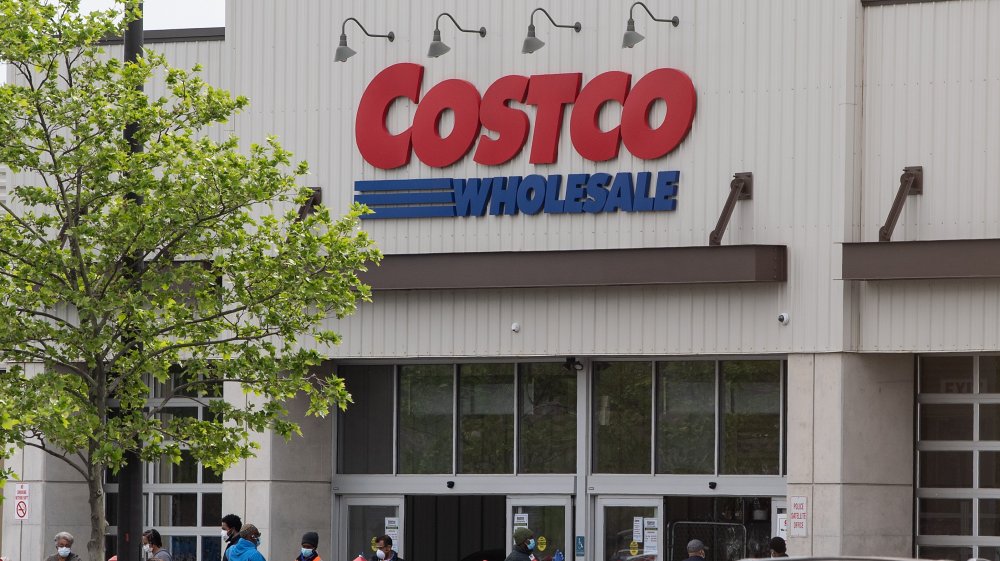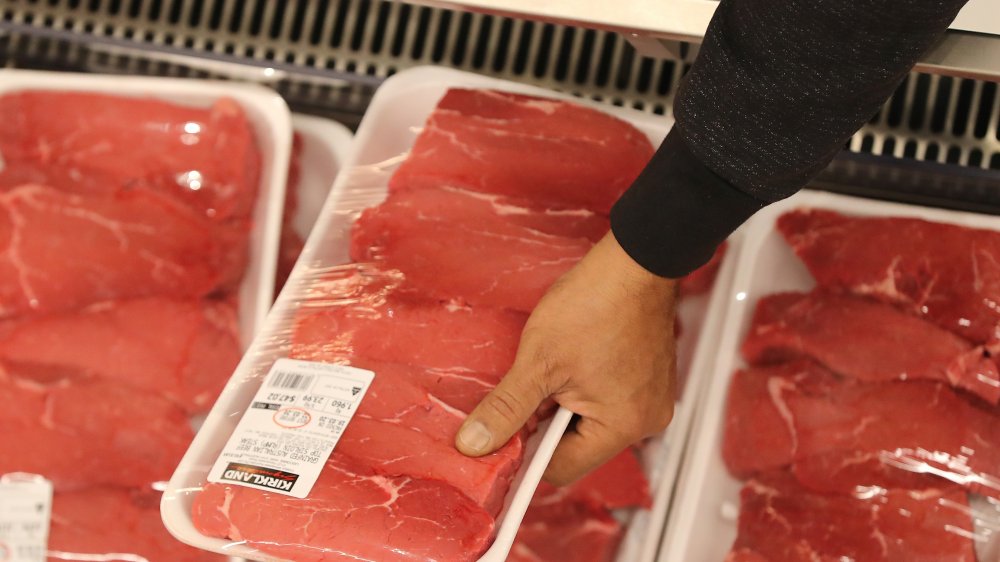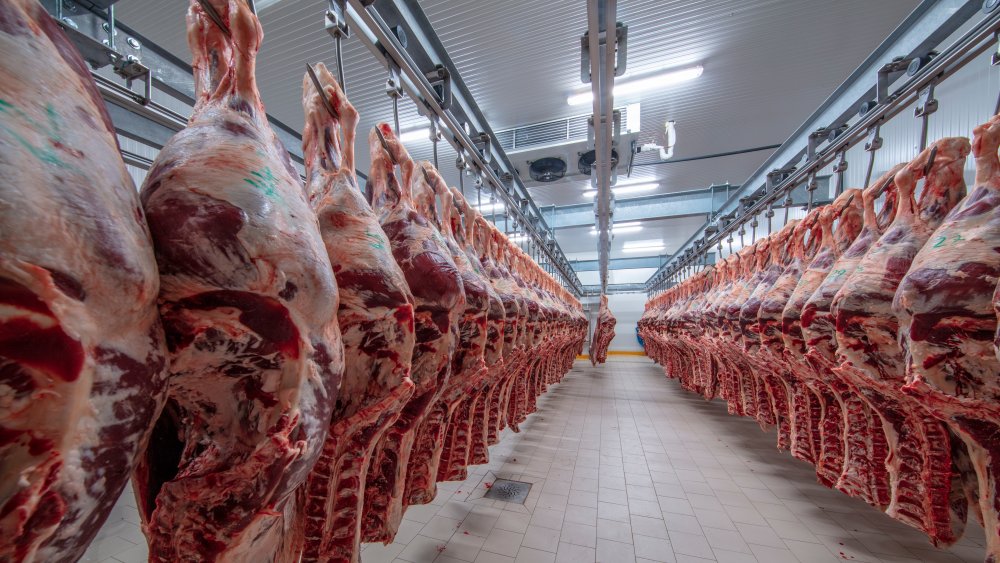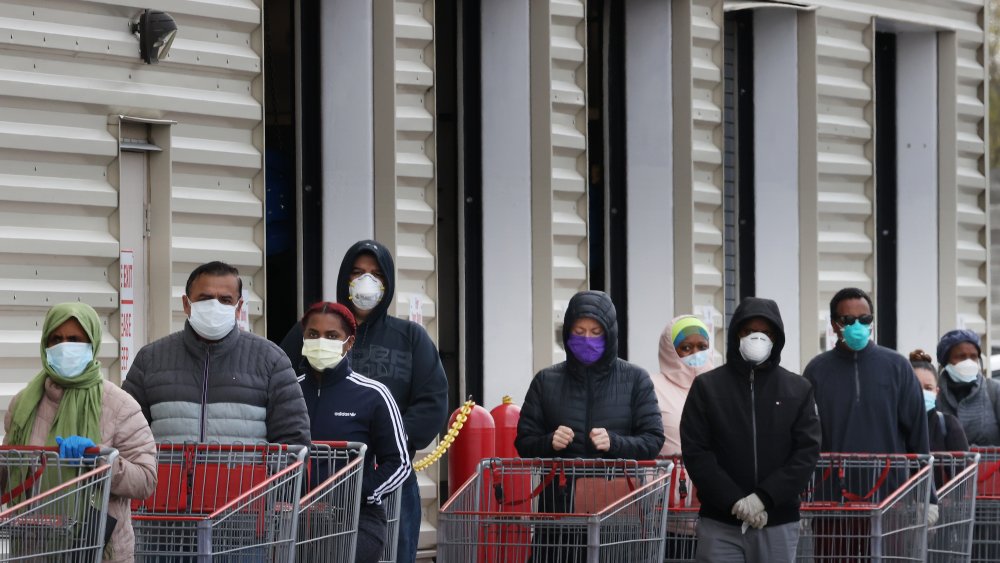The Real Reason Costco Is Restricting The Purchase Of This Product
Costco recently announced it will limit purchases on an in-demand product to make sure more of its members can get what they "want and need." In an update on the company website, Costco explains, "Our buyers and suppliers are working hard to provide essential, high demand merchandise as well as everyday favorites." With that in mind, the chain informs customers, "Fresh meat purchases are temporarily limited to a total of 3 items per member among the beef, pork and poultry products."
On the same page of updates, Costco shares other COVID-19 related changes to its shopping policies, including requiring guests and store employees to wear face coverings at all times (leading to members across the country to threaten a boycott of the beloved wholesale retailer), and offering special shopping hours for members over the age of 60. Overall, there is no doubt the experience of shopping at Costco, or any grocery store for that matter, has changed drastically in the wake of the pandemic.
Why meat purchases are being limited at Costco
Costco is not the first grocer to limit the purchase of meat during these challenging times. USA Today reports Kroger and Wegmans are likewise restricting purchases of pork and ground beef; Wegmans is also limiting how much chicken breast customers can buy. But why is meat being limited, specifically, when we mostly hear about a shortage of products like paper towels, toilet paper and disinfectant spray?
It has to do with meat processing plants being shut down due to coronavirus. The math is easy; if, according to USA Today, 6,300 positive cases are tied to meatpacking facilities as of April, and many of them, including high-profile plants like a Tyson Foods plant in Iowa, where more than 50 percent of workers are infected, are being forced to slow production or shut down completely, Americans will see less meat at stores (via NBC News).
"We have and expect to continue to face slowdowns and temporary idling of production facilities from team member shortages or choices we make to ensure operational safety," Tyson said in a statement, according to NBC News.
Meat supply chain vulnerability is behind Costco's decision to limits purchases
It's clear the supply chain is subject to great vulnerability given these slowdowns and potential closures, as safety remains the most important consideration for Americans. To head off possible panic-related overbuying of meat by consumers, it makes sense that Costco would limit meat purchases at this uncertain time. Especially considering in smaller stores, meat purchases are not being limited, and customers are bulk buying.
In Nebraska, where state leaders say the meat supply is down about 25 percent, but the demand is up nearly 30 percent (via KETV), panic buying is becoming a big issue. "If they [consumers] would just buy the normal amount of protein that they normally purchase, there would be plenty in the meat case for everyone to choose from," the Nebraska Grocery Industry Association executive director, Kathy Siefken, said.
Even the President acknowledges meat supply is a potential problem
President Trump says meat processing plants are a crucial part of the country's infrastructure, explaining on the White House website, "It is important that processors of beef, pork, and poultry ('meat and poultry') in the food supply chain continue operating and fulfilling orders to ensure a continued supply of protein for Americans. However, outbreaks of COVID-19 among workers at some processing facilities have led to the reduction in some of those facilities' production capacity."
Although, contrary to reports, Trump didn't demand meat processing plants stay open under unsafe conditions (via The Washington Post), clearly the meat shortage is of utmost importance to the nation, and being scrutinized by the top levels of government in an effort to find solutions and improve conditions. Because it's not just meat plant workers and consumers who are suffering due to the pandemic. With plants operating at limited capacity, cattle ranchers, for example, have nowhere to sell their product. The National Cattlemen Association says the American cattle industry has lost a staggering $13 billion due to COVID-19 (via KATV).
Costco is just doing its part to help supply chain issues and ensure the most customers possible get their protein from its stores. Hopefully this will be a short-lived sacrifice (and a small one, given how much others are sacrificing during this pandemic — such as health or a job) members will have to make; after all, we know how much Costco shoppers love to bulk buy, or else they wouldn't shop at the warehouse superstore in the first place.



